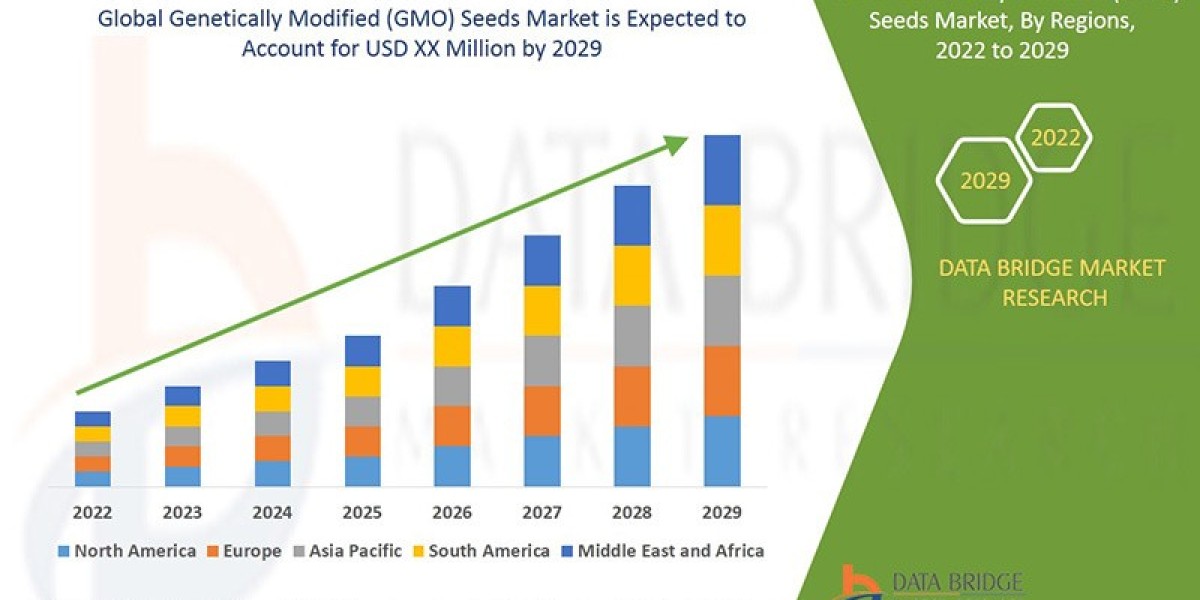Introduction
The genetically modified (GMO) seeds market has become a central component of modern agriculture, driving innovation, productivity, and sustainability in global food systems. GMO seeds are developed through genetic engineering techniques to enhance desirable traits such as pest resistance, herbicide tolerance, drought resilience, and higher yield potential. By reducing dependency on chemical inputs and improving crop resilience against environmental challenges, GMO seeds play a pivotal role in meeting the growing demand for food security.
Globally, the relevance of the GMO seeds market has increased in response to rising population pressures, limited arable land, and climate-related disruptions. Farmers across both developed and developing regions are increasingly adopting GMO seeds to maximize output while reducing operational risks. The market extends across major crops such as corn, soybean, cotton, canola, and emerging specialty crops, offering opportunities for seed producers, biotech firms, and agricultural investors.
This report provides an in-depth analysis of the GMO seeds market, highlighting its current landscape, drivers, challenges, segmentation, competitive dynamics, and future growth prospects. It serves as a valuable resource for stakeholders seeking insights into one of the most transformative sectors of global agriculture.
Source - https://www.databridgemarketresearch.com/reports/global-genetically-modified-gmo-seeds-market
Market Overview
The GMO seeds market encompasses genetically engineered seeds designed to enhance agronomic performance, improve food security, and promote sustainable farming. These seeds are developed by modifying the genetic structure of crops to express traits such as pest resistance, herbicide tolerance, improved nutritional content, or adaptability to adverse climatic conditions.
Historically, GMO crops were first commercialized in the mid-1990s, beginning with herbicide-tolerant soybean and insect-resistant corn. Since then, adoption has expanded globally, with GMO crops cultivated across millions of hectares in North and South America, parts of Asia, and increasingly in Africa. Today, GMO seeds account for a significant portion of global corn, soybean, and cotton production, making them indispensable to the global agricultural supply chain.
The current landscape reflects a steady rise in adoption driven by the dual need for food security and environmental sustainability. Biotechnology advancements have allowed companies to develop seeds tailored for region-specific challenges, such as drought tolerance in arid regions or pest resistance in tropical climates. While regulatory and public acceptance varies across regions, the global market continues to expand, with farmers recognizing the economic and agronomic benefits GMO seeds provide.
Market Drivers and Opportunities
The primary driver of the GMO seeds market is the increasing demand for higher agricultural productivity. With global population growth expected to surpass nine billion by 2050, the need for crops that deliver higher yields while minimizing land and resource use is urgent. GMO seeds provide a solution by enabling farmers to achieve consistent harvests even under challenging conditions.
Another significant driver is the rising prevalence of pests and plant diseases. GMO seeds engineered with pest-resistant traits reduce the need for chemical pesticides, lowering production costs and minimizing environmental impacts. Similarly, herbicide-tolerant seeds simplify weed management, allowing farmers to adopt more efficient cultivation practices.
Climate change has also intensified the demand for resilient crop varieties. GMO seeds designed with drought tolerance, saline resistance, or heat adaptability help ensure crop productivity in regions affected by shifting weather patterns. This presents long-term opportunities for seed developers targeting climate-resilient agriculture.
For businesses and investors, emerging markets represent lucrative opportunities. Countries in Africa and Asia, with expanding agricultural sectors and growing food demand, are poised to become key adopters of GMO technology. Beyond staple crops, there are opportunities in specialty seeds engineered for improved nutritional content, such as biofortified rice or vitamin-enriched corn, aligning with public health goals.
Market Challenges and Restraints
Despite its growth potential, the GMO seeds market faces several challenges. One of the most significant barriers is regulatory complexity. Approval processes for GMO crops are highly stringent and vary widely across countries. Lengthy evaluation timelines and costly compliance requirements can delay commercialization and limit the speed of innovation.
Public perception and consumer acceptance also pose challenges. In some regions, skepticism regarding GMO safety, coupled with preference for organic or non-GMO products, can restrict adoption. This has fueled debates and, in certain markets, led to labeling requirements that influence consumer choices.
Intellectual property and market concentration present another restraint. A few multinational corporations dominate the GMO seed sector, raising concerns about limited competition and high seed costs. Farmers in developing countries often face affordability issues, limiting widespread access to advanced seeds.
Supply chain vulnerabilities also impact the market. Dependence on global distribution networks makes GMO seed availability sensitive to trade disruptions, geopolitical tensions, or logistics bottlenecks. These challenges underscore the need for diversified production and distribution strategies to safeguard long-term growth.
Market Segmentation Analysis
The GMO seeds market can be segmented by crop type, trait, end-user application, distribution channel, and region.
By crop type, GMO seeds are most widely used in corn, soybean, cotton, and canola. Corn dominates due to its extensive use in food, feed, and biofuels, followed closely by soybean, which is essential for animal feed and edible oil production. Cotton also holds a substantial share, driven by demand for insect-resistant varieties in textile-producing regions. Specialty crops, such as sugar beet, alfalfa, and rice, represent emerging opportunities as biotechnology advances diversify the portfolio.
By trait, herbicide tolerance and insect resistance remain the most widely adopted modifications. However, stacked traits—seeds engineered with multiple characteristics—are gaining momentum, providing farmers with comprehensive protection against pests, weeds, and environmental stressors. Traits focused on drought tolerance and nutritional enhancement are also emerging as high-growth areas.
In terms of end-user applications, large-scale commercial farming dominates demand, particularly in North and South America, where agribusiness operations rely heavily on GMO technology. Smallholder farmers in developing regions are beginning to adopt GMO seeds, supported by government initiatives and international development programs.
Distribution channels primarily include direct sales from biotech firms to large farms and partnerships with local distributors for broader reach in emerging markets. The rise of e-commerce and digital agriculture platforms is also reshaping distribution, offering farmers greater access to seed information and purchasing options.
Regionally, North America and South America are the leading markets, with the United States, Brazil, and Argentina among the largest adopters. Asia-Pacific is witnessing rapid growth, particularly in India, China, and the Philippines. Africa represents a high-potential market, with countries like South Africa already cultivating GMO crops and others exploring adoption through pilot programs.
Competitive Landscape
The competitive landscape of the GMO seeds market is dominated by a handful of multinational corporations with extensive R&D capabilities and global distribution networks. These players hold strong intellectual property portfolios, allowing them to maintain leadership through proprietary seed technologies.
Recent years have seen significant consolidation, with major mergers and acquisitions reshaping the competitive environment. Large agribusiness firms have expanded their product portfolios and geographic reach by acquiring smaller seed companies or partnering with regional players. Strategic alliances with governments, research institutions, and agricultural organizations are also common, enabling the development of seeds tailored for local agronomic conditions.
Innovation is a key competitive strategy. Companies are investing heavily in developing next-generation traits such as drought tolerance, nitrogen-use efficiency, and biofortification. Digital agriculture platforms that integrate seed sales with precision farming tools are another area of focus, providing farmers with end-to-end solutions.
To remain competitive, firms are also emphasizing sustainability, promoting GMO seeds as a means to reduce chemical use, conserve water, and enhance climate resilience. This aligns with broader corporate social responsibility and environmental goals.
Future Outlook and Trends
The future of the GMO seeds market is shaped by advances in biotechnology, evolving consumer expectations, and the global push for sustainable agriculture. Over the next decade, stacked traits and climate-resilient seeds will dominate development pipelines, addressing both productivity and environmental challenges.
Gene-editing technologies such as CRISPR are expected to revolutionize seed development, offering faster, more precise, and cost-effective solutions compared to traditional genetic engineering. This could expand the range of GMO crops beyond staples, introducing innovations in fruits, vegetables, and specialty crops.
Consumer-driven trends toward health and nutrition will also shape the market. Biofortified GMO seeds that enhance the nutritional value of staple foods are expected to gain traction, aligning with global efforts to combat malnutrition. Sustainability concerns will further drive adoption, as GMO seeds enable reduced pesticide use, lower greenhouse gas emissions, and improved soil health.
Regionally, growth will remain strong in North and South America, but Asia-Pacific and Africa represent the most significant expansion opportunities. Governments in these regions are increasingly recognizing the role of GMO technology in achieving food security, which will drive regulatory support and adoption.
Overall, the GMO seeds market is poised for steady growth, driven by a combination of technological innovation, global food demand, and sustainability imperatives.
Conclusion
The genetically modified seeds market is a cornerstone of modern agriculture, offering solutions to some of the most pressing global challenges, including food security, climate resilience, and sustainable farming. It is driven by the demand for higher productivity, pest resistance, and adaptability to adverse conditions, with opportunities emerging in nutrition-focused and climate-resilient seed varieties.
While challenges such as regulatory hurdles, consumer skepticism, and supply chain risks remain, the market’s long-term growth trajectory is strong. Companies that invest in innovation, partnerships, and sustainability will be best positioned to thrive in this evolving sector. For stakeholders, the GMO seeds market represents not only a business opportunity but also a vital contribution to the future of global food systems.
Frequently Asked Questions
What is the current size of the GMO seeds market?
The market has expanded steadily since the commercialization of GMO crops in the 1990s. Today, GMO seeds account for a significant share of global corn, soybean, cotton, and canola production, reflecting their importance in global agriculture.
What are the key drivers influencing growth in this market?
Major drivers include the need for higher agricultural productivity, resistance to pests and diseases, climate change adaptation, and the demand for sustainable farming practices. Consumer interest in nutrition-enhanced crops also supports growth.
Which regions dominate the GMO seeds market?
North America and South America are the largest markets, with the United States, Brazil, and Argentina leading adoption. Asia-Pacific and Africa are emerging as high-growth regions, driven by increasing food demand and supportive government policies.
Who are the major players in the industry?
The market is dominated by multinational agribusiness corporations with strong R&D capabilities and extensive intellectual property portfolios. Regional seed companies and biotech startups are also contributing through localized innovations.
What are the latest trends shaping the future of this market?
Key trends include the adoption of stacked traits, the rise of gene-editing technologies like CRISPR, the development of biofortified crops, and a growing focus on sustainability and climate resilience.
What challenges could slow down growth in this sector?
Regulatory hurdles, public skepticism about GMO safety, market concentration, affordability issues in developing regions, and supply chain vulnerabilities could impact growth.
How can businesses benefit from investing in the GMO seeds market?
Businesses can capitalize by focusing on innovative traits, expanding into emerging regions, and aligning with sustainability goals. Investments in gene-editing technologies and partnerships with governments and NGOs can further enhance market opportunities.
Browse More Reports:
Global Carbon Black Market
Global Cereal Bar Market
Global Data as a Service (DaaS) Market
Global Diagnostic Rapid Test Kits Market
Global Electric Engine Market
Global Electronic Skin Market
Global Endpoint Security Market
Global Epilepsy Market
Global Facility Management Market
Global Farm Healthcare Market
Global Food Certification Market
Global Functional Food Market
Global Genetically Modified (GMO) Seeds Market
Global Heat Pumps Market
Global Immunosuppressant Market
Global Insect Protein Market
Global Instant Beverage Premix Market
Global Internet of Robotic Things (IoRT) Market
Global Liquid Biopsy Market
Global Luxury Car Leasing Market
About Data Bridge Market Research:
An absolute way to forecast what the future holds is to comprehend the trend today!
Data Bridge Market Research set forth itself as an unconventional and neoteric market research and consulting firm with an unparalleled level of resilience and integrated approaches. We are determined to unearth the best market opportunities and foster efficient information for your business to thrive in the market. Data Bridge endeavors to provide appropriate solutions to the complex business challenges and initiates an effortless decision-making process. Data Bridge is an aftermath of sheer wisdom and experience which was formulated and framed in the year 2015 in Pune.
Contact Us:
Data Bridge Market Research
US: +1 614 591 3140
UK: +44 845 154 9652
APAC : +653 1251 975
Email:- corporatesales@databridgemarketresearch.com







